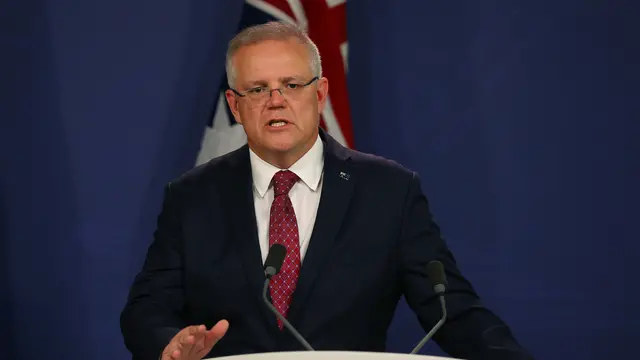
**Editor's note: **Andrew Korybko is a Moscow-based American political analyst. The article reflects the author's views and not necessarily those of CGTN.
China and Australia had a unique opportunity to enter into a much-needed rapprochement following last month's agreement to establish the Regional Comprehensive Economic Partnership (RCEP), but Prime Minister Scott Morrison risks ruining it.
Chinese Foreign Ministry spokesman Zhao Lijian was shocked by the conclusion of an Australian government investigation which found that some of its soldiers illegally killed at least 39 Afghans over the years. He shared a thought-provoking image on Twitter that showed one of their soldiers holding a knife to an Afghan child's neck and was captioned "Don't be afraid, we are coming to bring you peace!" while calling upon the government to hold its war criminals responsible. This brave act of public diplomacy, however, ended up triggering Morrison.
Instead of showing the world his country's commitment to Western democratic values and human rights, he sought to distract the global public by attacking the Chinese spokesman and demanding that he apologize. To China's credit, it didn't back down and reaffirmed that Australia must take accountability for its actions. It was very dishonest of Morrison to unconvincingly attempt to deflect from the world's criticism of his armed forces' atrocious conduct in Afghanistan by attacking China instead of apologizing for their war crimes.
By implying in a social media message that China was spreading fake news, the Australian leader himself was the one who ironically ended up spreading actual fake news. This was hugely embarrassing for Australia and explains why he later attempted to walk back his undiplomatic conduct by calling for "constructive engagement" between the two countries. Nevertheless, the damage was done.
The unexpected flicker of hope in real "constructive engagement" occurred last month after 15 nations, including China and Australia, agreed to create the RCEP, yet those hopes are fast dimming after recent events. Trust between the two is seriously hurt after what Morrison did, and he'll have to do more than repeat high-sounding rhetoric if he wants to repair it.
This isn't just about the recent controversy over Australian war crimes in Afghanistan, but about the whole gamut of Chinese-Australian relations. While China expected Australia to moderate its previously hostile policies towards the People's Republic after RCEP, Canberra apparently had no such intentions as evidenced by Morrison's dishonest diplomatic aggression.
This kind of behavior was genuinely strange since China is Australia's top trading partner so such provocations are almost self-destructive. It, however, made many wonder whether the country was simply pandering to its American "big brother" at the expense of its national interests.
In order to restore the viability of their potential rapprochement, Australia must cease to submit to U.S. foreign policy demands and promptly leave America's anti-Chinese bandwagon. Continuing to meddle in China's internal affairs in Hong Kong, Xinjiang, and the South China Sea at the behest of its American ally proves that Australia isn't as independent as it claims to be.
Until it stops engaging in such hostility by backing up Morrison's recent rhetoric with concrete action, China simply cannot trust Australia to remain true to its word. Morrison's counterproductive policies towards China must stop at once in order to restore hope for a rapprochement between the two and avert that dire scenario.
(If you want to contribute and have specific expertise, please contact us at [email protected].)
 简体中文
简体中文

